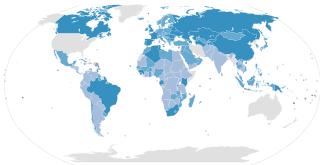 W
WThe Republic of Afghanistan was the name of the first republic of Afghanistan. It is often called the Daoud Republic, as it was established in 1973 after Mohammed Daoud Khan deposed his cousin, King Mohammad Zahir Shah, in a non-violent coup. Daoud was known for his progressivism and attempts to modernize the country with help from both the Soviet Union and the United States, among others.
 W
WThe Asia Pacific Telecommunity (APT) was founded on the joint initiatives of the United Nations Economic and Social Commission for Asia and the Pacific (UNESCAP), and the International Telecommunication Union (ITU).
 W
WThe Convention on the Prohibition of the Development, Production and Stockpiling of Bacteriological (Biological) and Toxin Weapons and on their Destruction was the first multilateral disarmament treaty banning the production of an entire category of weapons.
 W
WThe Convention on the Prevention of Marine Pollution by Dumping of Wastes and Other Matter 1972, commonly called the "London Convention" or "LC '72" and also abbreviated as Marine Dumping, is an agreement to control pollution of the sea by dumping and to encourage regional agreements supplementary to the Convention. It covers the deliberate disposal at sea of wastes or other matter from vessels, aircraft, and platforms. It does not cover discharges from land-based sources such as pipes and outfalls, wastes generated incidental to normal operation of vessels, or placement of materials for purposes other than mere disposal, providing such disposal is not contrary to aims of the Convention. It entered into force in 1975. As of September 2016, there were 89 Parties to the Convention.
 W
WThe ILO Convention concerning Minimum Age for Admission to Employment C138, is a convention adopted in 1973 by the International Labour Organization. It requires ratifying states to pursue a national policy designed to ensure the effective abolition of child labour and to raise progressively the minimum age for admission to employment or work. Convention C138 replaces several similar ILO conventions in specific fields of labour.
 W
WThe Tripartite Consultation Convention, 1976, officially the Convention concerning tripartite consultations to promote the implementation of international labour standards is an International Labour Organization Convention, which governs the process for implementation of measures regarding ILO conferences. It requires tripartite consultation before ratification, implementing legislation or denouncement of conventions. As of June 2015, the convention had been ratified by 139 member states. The convention is also known as convention number 144 on the List of International Labour Organization Conventions.
 W
WThe World Tourism Organization (UNWTO) is the United Nations specialized agency entrusted with the promotion of responsible, sustainable and universally accessible tourism. It is the leading international organization in the field of tourism, which promotes tourism as a driver of economic growth, inclusive development and environmental sustainability and offers the sector leadership and support in advancing knowledge and tourism policies worldwide. It serves as a global forum for tourism policy issues and a practical source of tourism research and knowledge. It encourages the implementation of the Global Code of Ethics for Tourism to maximize the contribution of tourism to socio-economic development, while minimizing its possible negative impacts, and is committed to promoting tourism as an instrument in achieving the United Nations Sustainable Development Goals (SDGs), geared towards eliminating poverty and fostering sustainable development and peace worldwide.